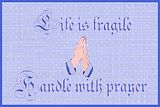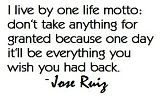"That's life -- ya got' stop lookin' at wut ya don't have, and be thankful for wut ya do have."
He smiled as he said it, shrugging his shoulders. A burly man of about fifty, with twinkling eyes and a warm sense of humour, he had the demeanour of someone who had probably been a pretty mischievous chap back in his heyday.
I didn't meet him in hospital. But when people hear you're a student doctor, even those you meet outside have a way of placing a tremendous amount of trust in you. They tell you things -- and what a privilege it is.
When I said I was posted in surgery, a witty reply came, punctuated by a chuckle:
"Oh I've been in surgery too, just on the wrong side of the table."
I had to laugh. But in truth, it was no laughing matter. Having been through a major struggle with a fungal infection of the ear, he had gone under the knife for three mastoidectomies. Ear surgeries, to put it simply, often performed in massive infections of the ear, when medications cease to work.
As one can guess, no bodily organ can remain the same after that many surgeries. He came through without any other complications, but he lost his hearing in one side. Three mastoidectomies were just too much for that left ear. After surgery, diabetes and sleep apnoea flared up, and until today, a few months after his final round of surgery, he still has to cope with balance problems and he hasn't returned to work.
He turned to direct his good ear to me.
"You know, my wife's hearing is going too, in the same left ear."
"So she'd have to stand like -- this?" I turned to face my right ear to his, and realized immediately what a tricky position it was for conversation.
"Yeh," came the drawl with a laugh.
"Can you imagine taking a walk together? We keep having to shift places!
" Smiling and looking at his wife, in a flowery dress, talking to two ladies some distance off, he pondered for a bit. "But all's good, all's good. I'm just thankful to be here today. You know, I could be so much worse off. Just thankful."
I imagined the couple, probably married for a good twenty to thirty years by now, walking down a street, or in a park. Man and wife. Maybe they used to walk down the same street when the wrinkles and grey hairs were lesser, and the hearing was clearer. Now a little adaptation was required, a little
'dance' -- he shifting to one side to say something into her good ear, and she shifting to reply.

And I don't think either one of them would feel it was any trouble. If I could take a photograph, it'd paint perfectly the phrase: '
Growing Old Together'.
Simply because they
loved each other. For better, for worse. For richer, for poorer. In sickness and in health.
And, not to be forgotten surely, in perfect hearing and in inconvenient deafness too.
"Just thankful for wut ya have." :)
"I cannot promise you a life of sunshine;
I cannot promise riches, wealth or gold;
I cannot promise you an easy pathway
That leads away from change or growing old.
But I can promise all my heart's devotion
A smile to chase away your tears of sorrow;
A love that's ever true and ever growing;
A hand to hold in yours through each tomorrow."
- Mark Twain (1853-1910)
Mom, Dad -- this one's for you. :)
* Image taken from http://www.flickr.com/photos/tokaris/207335658/sizes/m/
 Fervent. Desperate. Whispered to the Divine, more earnest than she'd been in a long time. Too long.
Fervent. Desperate. Whispered to the Divine, more earnest than she'd been in a long time. Too long.











